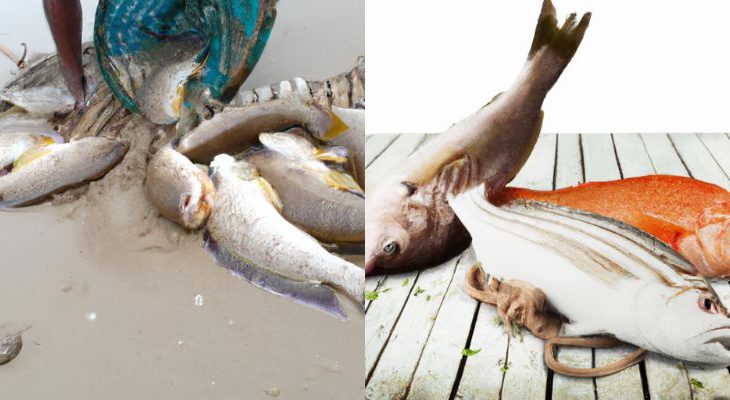Fishing is a significant economic activity, providing livelihoods for millions of people around the world.
However, overfishing and unsustainable fishing practices are causing significant harm to our oceans, marine ecosystems, and coastal communities.
Sustainable fishing practices are crucial for ensuring the long-term viability of our oceans and the livelihoods of fishing communities.
What is sustainable fishing?
Sustainable fishing refers to fishing practices that ensure the long-term health and viability of marine ecosystems, while also supporting the economic and social well-being of fishing communities.
It involves using fishing methods that do not cause significant harm to the environment, and that allow fish populations to replenish and thrive over time.
Principles of sustainable fishing include responsible management of fish stocks, minimizing bycatch, avoiding harmful fishing methods such as bottom trawling and dynamite fishing, and promoting the use of sustainable fishing gear and equipment.
The importance of sustainable fishing practices
Protecting marine ecosystems:
Sustainable fishing practices are critical for protecting the health and viability of marine ecosystems. Overfishing and destructive fishing methods can cause significant harm to marine biodiversity, leading to the depletion of fish stocks, the loss of habitat, and the disruption of food chains.
By using sustainable fishing methods, we can help maintain healthy and diverse marine ecosystems, supporting not just fish populations but also other marine creatures and the entire oceanic food web.
Sustainable fishing also helps to mitigate the impacts of climate change, as healthy marine ecosystems can act as carbon sinks, absorbing and storing carbon dioxide from the atmosphere.
Supporting coastal communities:
Fishing is a vital economic activity in many coastal communities, providing income and livelihoods for millions of people worldwide. Sustainable fishing practices are critical for ensuring the long-term viability of these communities, as well as safeguarding the cultural and social heritage associated with fishing.
By promoting sustainable fishing, we can help ensure that coastal communities can continue to rely on fishing as a source of income and food. Sustainable fishing practices can also support the development of local economies, by promoting tourism, sustainable aquaculture, and responsible resource management.
Ensuring long-term economic viability:
Sustainable fishing practices are crucial for ensuring the long-term economic viability of the fishing industry. Overfishing and unsustainable fishing practices can lead to the depletion of fish stocks, causing a decline in the industry’s profitability over time.
By adopting sustainable fishing practices, we can help ensure the long-term economic viability of the fishing industry, by promoting responsible management of fish stocks, reducing the costs associated with bycatch and environmental damage, and promoting the use of sustainable fishing gear and equipment.
The consequences of unsustainable fishing practices
Overfishing and depletion of fish stocks:
One of the most significant consequences of unsustainable fishing practices is the depletion of fish stocks. Overfishing, the use of destructive fishing methods, and inadequate management of fish stocks can lead to the decline and collapse of fish populations, leading to significant economic, social, and environmental impacts.
Harm to marine ecosystems:
Unsustainable fishing practices can cause significant harm to marine ecosystems, leading to the loss of habitat, the destruction of biodiversity, and the disruption of food chains.
This can have far-reaching impacts on marine life, including threatened and endangered species, and can also impact the health and productivity of fisheries over the long term.
Negative impact on coastal communities:
Unsustainable fishing practices can have significant negative impacts on coastal communities, including the loss of income and livelihoods, and the erosion of cultural and social heritage associated with fishing.
Overfishing and destructive fishing methods can also impact the availability of fish for local consumption, leading to food insecurity and malnutrition in some cases.
How can we achieve sustainable fishing practices?
Achieving sustainable fishing practices requires a concerted effort from governments, the fishing industry, and the public. Here are some ways we can promote sustainable fishing practices:
Implement responsible fishery management practices: Governments can adopt responsible fishery management practices, such as setting fishing quotas and implementing fishing regulations, to help ensure that fish populations are sustainably managed.
Promote sustainable fishing gear and equipment: The fishing industry can adopt sustainable fishing gear and equipment, such as fish traps and hooks, which can reduce bycatch and other environmental damage.
Reduce food waste: Consumers can help reduce food waste by only buying and consuming sustainably sourced fish, and by avoiding fish that are caught using unsustainable practices.
Support sustainable aquaculture: Aquaculture, or fish farming, can be a sustainable alternative to wild fishing. By supporting sustainable aquaculture practices, we can help reduce the pressure on wild fish populations.
Raise public awareness: By raising public awareness about the importance of sustainable fishing practices, we can help promote more responsible fishing practices and help build support for sustainable fishing practices.
Frequently Asked Questions:
What is overfishing?
Overfishing refers to the practice of fishing more fish than can be replenished naturally, leading to a decline in fish populations over time. This can have significant economic, social, and environmental impacts.
What is bycatch?
Bycatch refers to the unintended capture of non-targeted fish, marine mammals, and other species in fishing gear. Bycatch can lead to significant environmental damage and can also impact the economic viability of the fishing industry.
What are some sustainable fishing practices?
Sustainable fishing practices include responsible fishery management, reducing bycatch, promoting the use of sustainable fishing gear, and supporting sustainable aquaculture.
Conclusion:
Sustainable fishing practices are crucial for protecting the health and viability of marine ecosystems, supporting the economic and social well-being of fishing communities, and ensuring the long-term economic viability of the fishing industry.
By adopting sustainable fishing practices, we can help ensure that our oceans and coastal communities remain healthy and viable for generations to come.
……………………………..
Here are some references that provide further information on the importance of sustainable fishing practices:
“Sustainable Fishing: What It Is and Why It Matters.” National Geographic Society, 23 Jan. 2019, www.nationalgeographic.com/environment/2019/01/sustainable-fishing-what-it-is-why-it-matters/.
“Overfishing: A Threat to Marine Biodiversity.” The Ocean Foundation, 3 Dec. 2018, oceanfdn.org/blog/overfishing-threat-marine-biodiversity.
“Sustainable Seafood.” Monterey Bay Aquarium, www.montereybayaquarium.org/seafood-watch/sustainable-seafood.
“Sustainable Fishing: Why It’s Critical and How to Achieve It.” Environmental Defense Fund, 22 Mar. 2018, www.edf.org/oceans/sustainable-fishing.
“Sustainable Fishing: A Comprehensive Guide.” Greenpeace, 23 Feb. 2021, www.greenpeace.org/usa/sustainable-fishing-a-comprehensive-guide/.





